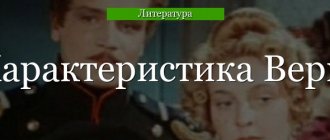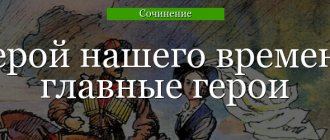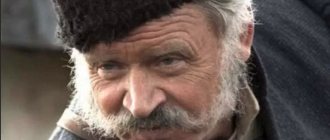Reviews of the book “Hero of Our Time” by Mikhail Lermontov
“I was created stupidly: I don’t forget anything, nothing!”
" Well?
die like that die! the loss to the world is small; and I’m pretty bored myself. I am like a man yawning at a ball who does not go to bed only because his carriage is not yet there. But the carriage is ready... goodbye!..” I have several favorite books from the school curriculum that I like to re-read regularly, and “A Hero of Our Time” is one of them, perhaps even the most favorite...
A lot of excellent reviews have been written about this book by both critics and literary scholars, and here on LiveLib there are plenty of reviews for this wonderful book - why repeat it? Therefore, my review is purely personal impressions (without a detailed analysis of the work), so to speak, a few thoughts on the topic...
«And many other similar thoughts passed through my mind; I didn’t hold them back because I don’t like to dwell on some abstract thought. And what does this lead to?.. In my first youth I was a dreamer, I loved to caress alternately gloomy and rosy images that my restless and greedy imagination painted for me. But what does this leave me with? just tired
, like after a night battle with a ghost, and a vague memory filled with regrets.
In this vain struggle I exhausted both the heat of my soul and the constancy of will necessary for real life; I entered this life having already experienced it mentally, and I felt bored and disgusted, like someone who reads a bad imitation of a book he has long known .
A novel (or story? travel notes? memoirs of Pechorin?), the attitude towards which practically does not change over time. It’s an amazing thing: you change, you grow up, but you still read with trepidation the pages dedicated to the life of Grigory Alexandrovich Pechorin.
- Why give hope? - Why did you hope? I understand wanting and achieving something, but who hopes?
The image as a collection of vices (from the preface to the book) turned for me, on the contrary, into a collection of virtues. Strength and nobility, determination and courage (I repeat that I am writing exclusively about personal impressions after reading), foresight and intelligence, the desire for independence from everything and everyone (especially from women who never had power over him), fatalism...
«Why do they all hate me? - I thought. - For what? Have I offended anyone
? No. Am I really one of those people whose mere sight generates ill will?”
I could go on and on - Pechorin is also one of my favorite literary heroes (it happens that I like a book, but not the hero, for example, like Doctor Zhivago, I like everything in A Hero of Our Time). He will never stoop to take revenge on a woman, he is not petty and not vindictive, he even seems to have no ambitions (at least in the book the author does not emphasize this).
“I like to doubt everything: this disposition of mind does not interfere with the decisiveness of my character - on the contrary, as for me, I always move forward more boldly when I do not know what awaits me. After all, nothing worse can happen than death—and you can’t escape death!”
He's not touchy. He can be a serious opponent to another man, but never to a woman. This is probably why all the beautiful people in the book like him so much and everyone remembers him almost with reverence. He does not promise anything to any of them, his indifference somehow becomes unusually attractive. For all. Perhaps the most beautiful book in Russian literature about love...
«I run through my entire past in my memory and involuntarily ask myself: why did I live? for what purpose was I born?.. And, it’s true, it existed, and, it’s true, I had a high purpose, because I feel immense strength in my soul... But I did n’t guess this purpose, I was carried away by the lures of empty and ungrateful passions
;
I came out of their crucible hard and cold as iron, but I lost forever the ardor of noble aspirations - the best light of life. And since then, how many times have I played the role of an ax in the hands of fate! Like an instrument of execution, I fell on the heads of the doomed victims, often without malice, always without regret... My love did not bring happiness to anyone, because I did not sacrifice anything for those I loved: I loved for myself, for my own pleasure
: I only satisfied a strange need of the heart, greedily absorbing their feelings, their joys and sufferings - and could never get enough
.
It is interesting to see how preferences for parts of a work change over the years. In my youth, I remember when I read it for the first time, I really liked “Bela” (that’s understandable - the chapter seemed to me the height of romanticism), then, a couple of years later, while reading the novel, I was crazy about “Fatalist” (I also believe in predestination). But now, oddly enough, I liked “Taman” most of all (for some reason I didn’t like this chapter at all at school). Such an amazing book for all ages of life...
If we talk about personal impressions, how can we ignore the film adaptations?
I watched about 8 years ago (I don’t remember the exact time) a Russian mini-series based on Lermontov with Igor Petrenko in the title role:
Well, what can I say... I wasn’t impressed somehow. The actor is, of course, handsome, who can argue? But in drawing us the image of Pechorin, Lermontov never focused on beauty. Pechorin is daring, charisma, charm. some kind of detachment...
But somehow I also watched another film adaptation (or rather, even a theatrical production) with Oleg Dal in the title role.
I liked this director’s vision of my favorite literary hero much more: in my opinion, it is closer to the truth.
«Whether I am a fool or a villain, I don’t know; but it is true that I am also very worthy of pity, perhaps more than she: my soul is spoiled by light, my imagination is restless, my heart is insatiable; I can't get enough:
I get used to sadness just as easily as to pleasure, and my life becomes emptier day by day...
Everyone read on my face signs of bad feelings that were not there;
but they were anticipated - and they were born .
I was modest - I was accused of guile: I became secretive. I felt good and evil deeply; no one caressed me, everyone insulted me: I became vindictive; I was gloomy, - other children were cheerful and talkative; I felt superior to them; they put me below. I became envious. I was ready to love the whole world, but no one understood me: and I learned to hate
.
My colorless youth passed in a struggle with myself and the world; Fearing ridicule, I buried my best feelings in the depths of my heart: they died there. I told the truth - they didn’t believe me: I began to deceive; Having learned well the light and springs of society, I became skilled in the science of life and saw how others were happy without art, freely enjoying the benefits that I so tirelessly sought. And then despair was born in my chest
- not the despair that is treated with the barrel of a pistol, but
cold, powerless despair, covered with courtesy and a good-natured smile
.”
A book for all times. Closing the last page, I’m already looking forward to a new meeting))
Re-read as part of the game “Back to the Past”
Review of the book “Hero of Our Time” (M. Yu. Lermontov)
(367 words) We have all heard about the expression “lost generation”, which appeared in the 20s of the last century in America. In Russia there was a similar phenomenon back in the 19th century. People appeared who had wealth, did not need anything and had no purpose in life. They wasted their time on entertainment, but found no meaning in it and were constantly bored. This phenomenon is called “Russian blues”, and it has been described by many famous writers. A classic work in this direction is “Hero of Our Time” by Mikhail Yuryevich Lermontov.
The ironic title suggests that the main character is not an outstanding personality; on the contrary, he is a typical representative of his time. Grigory Aleksandrovich Pechorin is educated and smart, but at the same time he feels that he is wasting his time. The hero is constantly in search of himself, he quickly gets carried away by something and just as quickly cools down to it. Gregory is unhappy, as if he feels some higher force of fate that controls him. This is clearly confirmed in the last chapter “Fatalist”, where the main theme of the story is the predetermination of human fate.
Pechorin understands people very subtly. He uses this for his own purposes, for entertainment and manipulation. But in the end, this is what he suffers from. The reader sees that the hero is capable of experiencing true love. But when Gregory realizes this, it is too late. At the mineral waters, he meets Vera, a girl who has been in love with him for a long time and also suffered morally because of this. She has known Pechorin for a very long time and sees right through him. In her heart, she is giving him one last chance to be happy. But, at the moment when the hero realizes that Vera is the only woman with whom he could spend his life, she leaves.
The moment when Gregory sets off in pursuit of his beloved's carriage becomes significant for the figure of the hero. He gives up. He is afraid that, having caught up with Vera, he will still remain unhappy and thereby destroy her destiny.
Even though the main character seems to be the one who destroys people's lives, he still remains attractive to the reader. It’s as if two people live in Pechorin. One commits selfish acts, and the other condemns him for it. Grigory is trying to understand himself, realizing his dual nature and feeling great loneliness among the crowd. But at the same time, the hero is unable to change, and for these vices he blames society more than himself.
Author: Victoria Abrosimova
Interesting? Save it on your wall!
Interesting topics
- Bazhov - Sinyushkin Well
A simple guy Ilya inherited three feathers from his late grandmother: white, black and red. He wore them in his hat as a memory. And one more instruction so that he does not chase wealth, so - The Tragedy of Doctor Startsev
A.P. Chekhov is a Russian writer whose works center on controversial characters. The author of many novels and short stories gives psychological characteristics of the characters as they develop - Tolstoy - Prince Serebryany
The work tells about a respectable governor, Prince Serebryany, upon returning from the Battle of Livonia, he met with a mischievous gang of guardsmen, realized that something was happening in the state... - Chekhov - Chameleon
The hero of the story, Ochumelov, walking through the central square of the city, he comes across a crowd, led by a wonderful master, known to the whole town, Khryukin. He then waves his hand, those
Essay: Review of the novel “Hero of Our Time” for a reader’s diary (M.Yu. Lermontov)
“A Hero of Our Time” is the first psychological novel in Russian literature. M.Yu. Lermontov tells readers the “history of the human soul,” full of contradictions and secrets. In a psychological novel, the thoughts and feelings of the main character are at the center of the story. Thus, throughout the entire work, readers recognize Grigory Pechorin from different sides. He appears either cold-blooded or madly in love. I was particularly impressed by those pages of the novel “A Hero of Our Time”, in which Pechorin shows his subtle, vulnerable nature.
Let us remember how indifferently the main character acted with the savage Bela. He tormented the poor girl with his dislike and cold attitude. When his passion passed, all feelings faded away. Bela herself gradually faded away. Let us remember how the hero mocked the feelings of the young Princess Mary. However, we see a completely different Pechorin when the character meets his past love, Vera. There used to be a romance between them, which ended abruptly. Pechorin's emotions are exposed after reading the letter left by Vera. In it, she talked about her love for the hero, and that she was forced to leave with her husband, who found out about her real feelings. My attitude towards Pechorin changed a lot in this episode. As if something had suddenly taken possession of him, he, like a madman, “set off at full speed along the road to Pyatigorsk” after the girl. The thought that the hero would not have time to say goodbye to Vera choked him and hit his mind like a hammer. He chased along the rocky road until his horse’s last breath, until he finally drove the animal to death. Pechorin was hysterical. He cried, laughed, and when his horse fell, the hero threw himself on the ground and sobbed like a child. All his firmness, all his composure - “disappeared like smoke.” Before us was not a selfish, arrogant character, but a gentle, sensitive hero suffering due to the loss of his beloved. This scene makes you think about how contradictory and mysterious the human soul is! What does the author teach us? Apparently, it’s because we don’t fully know ourselves, let alone others?
My opinion about the novel “A Hero of Our Time” is positive, because every page of it becomes a literary masterpiece. The writer is especially attentive to the description of nature, to changes in the inner world of man. Every moment in the novel has a special meaning. However, my favorite pages were from the chapter “Princess Mary”. It was in this part that I saw Pechorin from the other side, and better understood his contradictory nature.
Previous
EssaysEssay: Love in the story “The Captain's Daughter” (A.S. Pushkin)
Next
EssaysEssay: Characteristics of Napoleon in the novel “War and Peace” (+ table)




